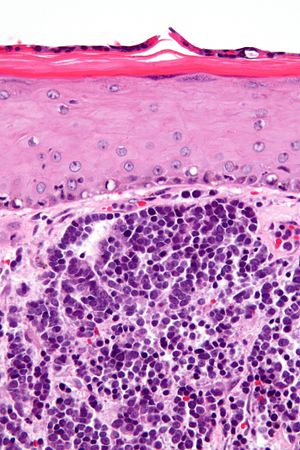Merkel cell carcinoma
| Merkel-cell carcinoma | |
|---|---|
 |
|
| Micrograph of a Merkel-cell carcinoma. H&E stain. | |
| Classification and external resources | |
| Specialty | Oncology |
| ICD-10 | C44 (ILDS C44.L44) |
| ICD-9-CM | 209.31 - 209.36 |
| ICD-O | M8247/3 |
| DiseasesDB | 31386 |
| eMedicine | DERM/262 ent/714 |
| MeSH | D015266 |
Merkel-cell carcinoma (MCC) is a rare and highly aggressive skin cancer, which, in most cases, is caused by the Merkel cell polyomavirus (MCV) discovered by scientists at the University of Pittsburgh in 2008. It is also known as cutaneous APUDoma, primary neuroendocrine carcinoma of the skin, primary small cell carcinoma of the skin, and trabecular carcinoma of the skin.
Approximately 80% of Merkel-cell carcinomas are caused by MCV. The virus is clonally integrated into the cancerous Merkel cells. In addition, the virus has a particular mutation only when found in cancer cells, but not when it is detected in healthy skin cells. Direct evidence for this oncogenetic mechanism comes from research showing that inhibition of production of MCV proteins causes MCV-infected Merkel carcinoma cells to die but has no effect on malignant Merkel cells that are not infected with this virus. MCV-uninfected tumors, which account for approximately 20% of Merkel-cell carcinomas, appear to have a separate and as-yet unknown cause. These tumors tend to have extremely high genome mutation rates, due to ultraviolet light exposure, whereas MCV-infected Merkel cell carcinomas have low rates of genome mutation. No other cancers have been confirmed so far to be caused by this virus. Because of the viral origin for this cancer, immunotherapies are a promising avenue for research to treat virus-positive Merkel-cell carcinoma.
This cancer is considered to be a form of neuroendocrine tumor. While patients with a small tumor (less than 2 cm) that has not yet metastasized to regional lymph nodes have an expected 5-year survival rate of more than 80 percent, once a lesion has metastasized regionally, the rate drops to about 50 percent. Up to half of patients that have been seemingly treated successfully (i.e. that initially appear cancer-free) subsequently suffer a recurrence of their disease. Recent reviews cite an overall 5-year survival rate of about 60% for all MCC combined.
...
Wikipedia
